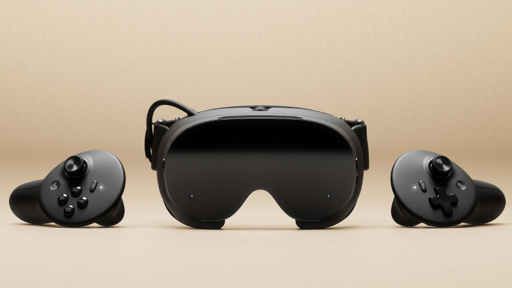- cross-posted to:
- linux@programming.dev
- hackernews@lemmy.bestiver.se
- cross-posted to:
- linux@programming.dev
- hackernews@lemmy.bestiver.se
Headset Tech Specs*
General
Processor
4 nm Snapdragon® 8 Gen 3 Architecture: ARM64
RAM
16GB Unified LPDDR5X RAM
Storage
256GB / 1TB UFS storage options
microSD card slot for expanded storage
Power
Rechargeable 21.6 Wh Li-ion battery
One USB-C 2.0 port in the rear, for charging and data
Charge with USB-C, 45W
Modular Headstrap
Headstrap includes integrated dual audio drivers and and rechargeable battery on rear. Headstrap weight: 245g
Core module can be separated from headstrap, for other headstrap solutions.
Display and Optics
Display
2160 x 2160 LCD (per eye)
72-144Hz refresh rate (144Hz experimental)
Optics
Custom pancake lenses Glass and non-glass optical elements Large FOV (up to 110 degrees)
IPD target range
60mm - 70mm
Eye glasses max width
140mm
Cameras and Tracking
Tracking
Inside-out camera based tracking
Cameras
4x outward facing monochrome cameras for controller and headset tracking
2x interior cameras for eye tracking and foveated streaming
Passthrough
Monochrome passthrough via outward facing cameras
Low-light support
IR illuminators for tracking and passthrough in dark environments
Expansion
User accessible front expansion port
Dual high speed camera interface (8 lanes @ 2.5Gbps MIPI) / PCIe Gen 4 interface (1-lane)
Connectivity
Wi-Fi
Wi-Fi 7, 2x2
Dual radios enable concurrent 5Ghz Wi-Fi and 6Ghz VR streaming
Wireless Adapter
Wireless adapter included in the box
Wi-Fi 6E (6GHz)
Provides direct, low-latency link between headset and PC
Bluetooth
Bluetooth 5.3
Audio
Speakers
Dual speaker drivers per ear, integrated into headstrap
Microphone
Dual microphone array
Size and Weight
Size
175mm x 95mm x 110mm (core module + facial interface)
Weight
440 g - core module + headstrap
185 g - core module
Software
Operating System
SteamOS 3 (Arch-based)
Desktop
KDE Plasma
ARM Linux running x86 Windows VR games? Very cool. The “foveated streaming” also sounds super cool. Looks like it will work as a standalone headset as well as when connected to a PC. microSD slot is a neat addition.
If this has like, perfect native Linux streaming, I’ll buy it in a heartbeat
I think it’s pretty good. Pushes forward ARM support for Steam and possibly better Qualcomm support for Linux in general. Another test platform for FEX and box64 developers. Another platform for Linux to chip away towards being a mainstream software platform. A hopefully price competitive VR headset against the Meta Quest 3 and preventing VR being so intertwined with Meta/Android/Apple. Regular Linux ecosystem now has a solid platform to keep up with the more controlled and/or proprietary operating systems
Inside. Out. Muthafuckin’. Tracking.
Finally. You know how like 50% of my posts in this sub are just me bitching about tracking towers? Christ. GabeN, my face is ready. Where do I stick my credit card?
I kind of disagree with their constant reference to wireless connectivity in a PCVR context as “streaming,” but I guess we need to pander to the lowest common denominator or no one will get it.
I hope they still work with lighthouses. Inside-out tracking is much worse than lighthouse tracking. Having the option would be nice.
It’s confirmed they don’t
Booooooooooooo
You can mix controllers and headsets in SteamVR, right? At least if you’re tethered or “streaming” or whatever from Steam on PC, I imagine you could use this plus an existing pair of lighthouse driven controllers if you really wanted to. If you can’t out of the box, I expect it to take about twelve seconds for motivated nerds to figure out how to force it into happening.
I obviously wouldn’t hold your breath for that being a thing when you’re using it as a standalone device.
Depending on the price, this might finally get me into VR
This might become my first headset. But, it needs to have the option to add prescription lenses, I don’t want to wear glasses inside the headset.
EDIT: They’re “working on it”, Tested video: https://youtu.be/b7q2CS8HDHU?t=2454
Third parties do a good job of making prescription inserts for a headsets that don’t have them.
Edit: in the Tested video, they say they are working on prescription inserts, and showed them.
Edit 2: I now see you made an edit before me. 😅
Idk how much wiggle room there is inside the headset (guessing not much) but look into respirator prescription glasses inserts - might be able to find one that fits.
You really don’t want to scratch the lenses on a VR headset it will drive you crazy.
Eye tracking software.
Eyyyy SteamOS, Arch + KDE. This looks like a great product. ETA: 2037
Apparently its shipping early next year actually. Based on earlier leaks though this has been in development more or less since the index.
And they called us madmen for believing in Deckard
The most important question is about tivoisation and other limits. Meta’s Quest, for example, is a pain in the ass, even in the matter of file access.
Considering it’s stated to run SteamOS, I think this is destined to be considerably less limited than other all-in-one devices. We won’t know for sure until we have it in our grubby little hands, of course, but I’m remaining cautiously optimistic.
For my own personal use case, I kind of don’t care. As long as I can use it in perpetuity as a competent PCVR headset tethered to my exiting fire-breathing PC, wireless or otherwise, I’m good. I think a much better metric will be whether or not this magically becomes a useless brick the instant its backing company loses interest in it and rugpulls all the existing users, like the WMR headsets. Or the first gen Vive Focus or whatever it was called. Or the Quest 2 any day now. Etc., etc. I think Valve has (or will have, hopefully) a better track record than most in that regard.
Theyre describing it as a small linux PC, which makes me hopeful. And given that its running SteamOS, I imagine it will be a very similar experience to the steam deck, with a streamlined main interface all in steam but the option to dive in deeper and customize the OS more.
This is really the best news announced today: Native Linux on the Steam Frame (and not Android)! The open-source x86 on ARM emus are good enough for gaming, so that should be fine for legacy VR titles.
WMR headsets can still be used, though admittedly requiring third party software.
I’m not concerned about the core OS. The driver situation is moderately uncertain (a whole lot of components that could have open source drivers, but which ALL need to be configured just right to work well). It’s certain stuff on top, especially Steam Input for handling inputs, which I’m concerned about. Removing all proprietary code would probably leave it usable but very inconvenient to use.
I’m sad to see they aren’t producing a premium headset. I was hoping they learned their lesson with the steam deck about the appetite for certain hardware but maybe the VR space is a totally different market.
That being said, this looks like it competes with the Big Picture 2 and I don’t know of a better headset sooooo this is likely what I’m gonna pick up.
All looks great but I’m curious about the controllers. I thought the Index controllers were supposed to be great but these look like the Oculus Rift 1 controllers.
Sacrifices were likely made for price point but also durability.
The knuckles are incredibly fragile controllers. I don’t know anyone who has a set for over 6 months without some weird quirk, or lost functionality in at least one of them
Honestly, I don’t really think there were sacrifices. They seem like just an upgrade to me.
- split gamepad button layout allows playing any game that can be played with a gamepad
- thumbsticks now magnetic, so drift should be a thing of the past (or at least, they will last far longer, index controllers had a big drift issue)
- still has individual finger tracking
- optional straps allow you to fully let go of the controller if you want the knuckles style
No more trackpads I guess, but I didnt like those much either, most games just treat them as a single button or maybe two and we got two more buttons on each controller in their place.
My used knuckles have been running great for about 3-4 years. Only issues are squeaky triggers (which could be fixed if I cared), the grip material rubbing off, and left stick capacitive touch losing half its sensitivity. I use them daily and smack them around a fair bit too.
I’ve had my index since 2020, and my knucks work perfectly! I take good care of my expensive shit, though.
My knuckles right stick doesn’t have capacitive touch anymore despite me never clicking the sticks in and taking care of it
I mean so do I?
I had 2 defects in the first year. I know 3 other people who bought indexes. All 3 had at least 1 defect that got them a full replacement of a controller within the first year of ownership.
It’s 5 years later and the battery which is not replaceable lasts about 5 minutes, so I have to always have an external pack. One controller it doesn’t detect all my fingers so I drop stuff unless I use the hard grab settings. The other has a trigger that gets stuck 7/10 times and that is after multiple replacements of each.
Not necessarily a problem except they are $300 to replace. Not exactly your $60 Xbox controller.
The controller feels a bit like a step back, especially if the camera tracking has issues on the back, but if the price point is correct this will be my go-to recommendation for people to steer away from Meta.
Edit: after watching the LTT video, they have an optional ergonomic package with slightly better headstrap, and more importantly a couple of straps for the controllers, which still have per-finger tracking! So you can still handle it like a knuckle controller!
It looks like they dropped the optical finger tracking on the triggers from the index. I wonder if they were causing problems?
The whole design is very reminiscent of the quest but I kinda like it, seems more lightweight instead of the heavy brick that the index is.
The tech looks good to me. Anyone know what the price point is?
I don’t think that’s been announced yet, but I really would not expect this to cost any less than the top end Steam Deck, i.e. at minimum $800. The spec sheet is already talking about different storage options, so there will probably be a few price tiers as well just like there is with the Steam Deck already.
Not seeing anything about the price point. I’m guessing Valve will try to keep it low, but that could be anything between $500 to $1000 considering the competition
One interview (Tested) they said they are aiming to keep the price below that of the index. I think a $800 to $900 price point is a fair assumption.
Early rumors were around $1200…
That said I hope it is lower. It is specc’d like a modern Quest so I hope it is priced like one too especially if we can only a 256gb and buy the wifi dongle seperately.
One website I was reading said this was slated to be cheaper than the Index full kit which was $999, IIRC.
They confirmed that is their plan in the Tested video review
LCD? Aww man. Will there be a way to use it on desktop like the quest, or are we just SoL stuck between $9999 pimax crystal hyperfuck and $4 quest crumpet
The linked blurb says you can tether it to your PC. It comes with its own USB stick for wireless connectivity for the same, per the pictures.














